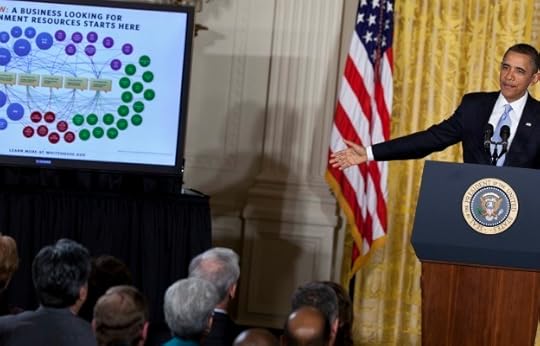Goodbye Commerce Department, you won't be missed

Fifteen years ago, Susan Levine, then Senior Vice President
of the Overseas Private Investment Corporation and I, recently having departed
my not entirely un-senior post at the Commerce Department, circulated a memo to
those who would read it that suggested the elimination of the Commerce
Department and the consolidation of many of the important trade negotiating and
financing agencies into a single department focused on trade issues. Today,
President Barack Obama asked Congress for the authority to make this
long-sought, common sense streamlining of the U.S. government a reality.
Obama has had a team, led by Jeffrey Zients, an extremely
effective official who before he came to government was an innovative and
successful business leader, working on this idea for a very long time now. Zients
was methodical, reaching out to literally hundreds of current and former
officials, business people, experts and others to understand what works, what
doesn't and how things could be organized to better and more efficiently serve
the American people. His proposals have been batted around at a senior level in
the government, faced natural pressure from those whose turf was being
threatened, faced equivalent pressure from those who just don't like change,
and throughout it Zients & Co. have persevered. Several times they nearly
made an announcement like that was made today. Several times the project
seemed dead.
But in the end, the effort advanced to the point of the
President's request today because its principle advocate and the one who
understood its merits most intuitively from the get-go was not Zients but his
boss' boss, President Barack Obama.
The request, which would undo the years of bureaucratic
confusion that turned Commerce and much of the economic side of the U.S.
government into the hodgepodge it is today, is first and foremost an effort to
win from the Congress the power to do what Republicans on the Hill have long
called for -- to start to reduce waste and inefficiency in the executive branch of
the U.S. government. The broad re-organizational fast-track power sought by
Obama is of a type no U.S. president has had since Ronald Reagan. But the
request is balanced, allowing Obama to make broad proposals for change but
requiring swift Congressional approval for those changes. In short, therefore, it is an area of potential bi-partisan agreement
and effective collaboration, a fact that has already been noted in early press
coverage of the announcement.
Commerce and the Small Business Administration would be
merged into a new entity that would also incorporate the Office of the U.S.
Trade Representative, Eximbank, the Overseas Private Investment Corporation, and
the Trade Development Agency. Parts of Commerce that never belonged there in
the first place, like NOAA, would move elsewhere -- with NOAA heading over to
Interior where it has always belonged.
Not only does the move make logical sense -- bringing together
all those agencies of the government that support the development of U.S. trade
and the job creation associated with it -- but it also would save, according to
initial White House estimates, over 1000 jobs and $3 billion over the next
ten years.
I note that in one of the early stories on the announcement,
former Clinton White House Chief of Staff John Podesta, was quoted as saying
that the plan will support U.S. competitiveness. This resonates with me both
because he is right and because when we wrote that memo 15 years ago, it was
Podesta who, despite the hue and cry from self-interested senior officials who
wanted to preserve their fiefdoms, took it seriously and considered it. He, Jim
Harmon, the then head of Eximbank, and just a couple of others were open to
really considering the long-term benefits such a reorganization would bring.
Periodically during the intervening decade and a half, I
would talk to a reporter who was doing a story on the bowl-of-spaghetti like
organizational chart of the international economic side of the U.S. government
and would hear of another cluster of folks who were supporting some similarly
sensible slimming down of a confusing, bloated, bureaucracy. But those
groundswells would recede and the issue would go back into hibernation.
Of course, things are very different now and the time is
suddenly right to make such a move. The U.S. needs to tighten its belt. This
kind of modest reform is, as some Republicans have already noted, just a first
step. Much more can and should be done. But this is a logical, painless first
step that is highly unlikely to be objected to by any major constituency being
served by the agencies in questions -- because in all likelihood, even with the
cuts, the efficiency and enhanced coordination that would result from the
consolidation would likely actually lead to much better service for U.S.
companies, consumers and others with a stake in our ability to tap into the
global economy.
As the President accurately said referring to the multiple
agencies he intended to fold together, "In this case, six isn't better than
one."
Another reason the timing works for this is that substantial
constituencies in both parties should and will actively support the move. Finally,
the President has gained special credibility in this area due to the
remarkable, if under-appreciated, success of his export initiative. Once
dismissed as mere window dressing, the President's push to double exports over
five years has seen a string of big successes: two years of export growth
averaging over 16 percent thus keeping the U.S. on track for his goal, record
lending by a much more aggressive and creative team at the U.S. Eximbank led by
Fred Hochberg, the approval of three long-delayed trade deals, enhanced trade
enforcement, and most importantly, exports contributing in a major way to
wealth and job creation nationwide.
From its absurdly muddled mission statement to the sad
little aquarium in its basement (which resembles nothing so much as a slightly
expanded version of the kind of fish tank you would find in a downscale Italian
restaurant in Plainfield, New Jersey), the Commerce Department is the Frankenstein monster of the federal bureaucracy. It's all bits and pieces
that belong in other places that have been sewed together by seemingly
distracted or perhaps slightly inebriated Congressional committees. Meanwhile,
U.S. trade is increasingly vital to our future and U.S. workers, consumers and
exporters all deserve better support -- and we could all do with eliminating
wasteful spending. As a consequence, the President's move is welcome on its
merits and as an excellent initial step toward more
sweeping reforms.
David Rothkopf's Blog
- David Rothkopf's profile
- 121 followers



